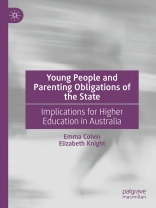This book explores how the increasing need for specific kinds of parental engagement impacts care-experienced young peoples’ trajectories. Previous Australian studies have found that care-experienced young people demonstrate poorer outcomes in health, education, and the criminal justice system throughout their life course. However, this multi-layered case study is the first to specifically address barriers in obtaining higher education—an effective tool for social mobility. In particular, the authors unpack how university marketing relies on young people to have a parent who understands tertiary education transitions to help them navigate post-school pathways to careers or higher education, as well as how policies might fail to help students who do not have such a figure in their lives. The authors offer suggestions for policy change in Australia while providing a basis for global comparisons and recommendations for how care-experienced young people and their support networks can overcome present challenges.
Table of Content
1 The Role of Parental Labour in Career Transitions: Introduction.- How This Book Came to Be.- Our Positionality.- Chapter Structure.- Terminology.- References.- 2 Care Experience and Transitions to Higher Education: How Our Understanding of a Particular Cohort’s Experience Illuminates Wider Experiences of Disparity in Education.- Introduction.- Bourdieu and the Bachelors’ Ball.- OOHC and Care Experience.- Histories of Abuse and Trauma.- Care Experience and Criminal Justice Over-representation.- Data Collection Issues.- Care, Careers, and Education.- Research Design and Methods.- References.- 3 Parenting as a Part of the School Ecosystem.- Introduction.- Parents Becoming Responsibilised and Part of the Schooling System.- Expectations of Parents.- Summary.- References.- 4 The Development of Career-Related Early Intentions in the Home.- Introduction.- Social Reproduction and Career Influences.- How Ideas About Careers Develop.- Career Support.- Expectations.- The Absence of Parental Support.- Role of Parents.- Summary.- References.- 5 Parents’ Assumed Role in Higher Education Transition.- Introduction.- Massification of Higher Education.- Transition Awareness.- Higher Education Institutions Marketing to Students.- Populations with Less Likelihood of Support.- Institutional Programmatic Support.- Institutional Support.- Summary.- References.- 6 Attenuated Youth: Support from Parents into Adulthood.- Introduction.- Support Needed in Higher Education.- National and Institutional Policy Support for All Students.- Gaps in Intergovernmental/Agency Collaboration.- Institutional Support in Higher Education.- Summary.- References.- 7 The Responsibilisation of Parental Labour in Education Practice: A Framework for Analysis.- Introduction.- Governmentality and Technologies of the Self.- Neoliberalism and Political Rationalities.- Neoliberalism, Governmentality, and Parenting.- The Parental Role.- The ‘Ideal Parent’.- Responsibilisation, Schools, and Parental Labour.- Responsibilisation, Deficit, and Parental Labour.- Parental Involvement in Higher Education.- Goldilocks Zone.- Conclusion.- References.- 8 Conclusion.- Introduction.- Recommendations.- Data Collection.- Systemic Focus on ‘Traditional’ Students and Deficit Discourse.- Institutional Resourcing and Support.- Future Research.- References.- Appendix A: Participant Pseudonyms.- Appendix B: Interview Schedule.
About the author
Emma Colvin is Senior Lecturer in Law and Criminology in the Centre for Law and Justice at Charles Sturt University, Australia.
Elizabeth Knight is Senior Research Fellow at the Mitchell Institute at Victoria University and Senior Lecturer in Career Education at James Cook University, Australia.












